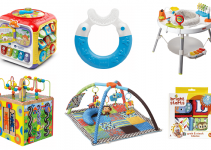
Perhaps you have heard that infants under one year shouldn’t consume honey. Many parents strive to keep a check on what their children consume.
But there are chances of a baby ingesting honey accidentally. Not knowing how to react in such a case leaves room for panic.
Read on and know the dangers of a baby consuming honey and how to manage the situation. Also, the post highlights when it’s safe for an infant to start taking honey.
Possible Dangers of Eating Honey
Adults and children over 12 months old can eat honey without any fear. But when kids below one year consume honey, they risk developing a life-threatening illness called infant botulism.
Although the infection is rare, no sensible parent would wish to gamble with the life of a child. So, it’s best to keep honey away from babies.
However, if your infant has consumed honey accidentally, keep watch over the baby for about 12 to 36 hours. During that period, watch for any signs of allergic reactions or unusual symptoms.
If your baby displays any unusual symptoms, seek help from your pediatrician. The dangers of eating honey include the following;
Possibility of Developing Botulism
The immune and digestive systems of infants are still developing and so are not fit for some foods such as honey.
That’s because about 25 percent of honey and its products have the C. botulinum bacteria that cause infant botulism.
The possibility of an infant developing botulism after consuming honey is minimal. But it’s safe to take precautionary measures.
One such measure is not feeding honey to the baby till he reaches one year. Also, it’s vital to beware of the signs and symptoms of botulism poisoning. Apart from honey, contaminated soil can also cause infection.
In most cases, the infant displays signs of the infection after 12 to 36 hours. However, there are cases where an infant doesn’t indicate any symptoms of the illness till after 14 days.
The symptoms of infant botulism include the following;
- Difficulty in breathing
- Weakening of muscles
- Blurred vision
- Poor control of the head
- lethargy
Possibility of An Allergic Reaction
When making honey, bees collect pollen from various flowers. On the other hand, babies have very sensitive bodies and ill-developed immunity.
Thus, there is a likelihood of honey causing an allergic reaction in infants. Raw honey hasn’t undergone much processing. So, the likelihood of having allergens is very high.
However, that doesn’t mean that canned (processed honey) is safe.
The allergic reaction may be mild or severe. For example, mild allergy symptoms include itching eyes and a running nose.
But in extreme cases, the infant can display life-threatening symptoms such as difficulty in breathing, tightening of the chest, and swollen tongue.
I gave My Baby Honey, what should I do?
Halt the Feeding
 The more honey the infant ingests, the higher the chances of sustaining a severe infection. Thus, you should prevent the baby from consuming more honey.
The more honey the infant ingests, the higher the chances of sustaining a severe infection. Thus, you should prevent the baby from consuming more honey.
Take away what she has been eating and replace it with a safer type of food.
Don’t Panic
Panicking won’t help. On the contrary, it may do you more harm. That’s because you need to stay alert.
It’s not obvious that once the child consumes honey, he’ll get infected. But even if she gets the infection, it will take hours for the symptoms to register.
Keep Watch for Signs and Symptoms of An Allergic Reaction
After calming down, keep an eye on signs of allergic reactions. Though not common, some infants have an allergy to honey. It’s the different samples of pollen that causes the allergy symptoms.
Watch Out for Infant Botulism Signs
The symptoms of infant botulism don’t show up immediately; they can delay up to 36 hours. Meanwhile, keep a close watch over the infant as the hours tickle by. If you notice any signs of botulism, seek quick medical intervention.
Only about 2 percent of infants succumb to the disease. Though curable, the victim may undergo a long treatment period and use breathing aids.
When Is It Safe to Give Babies Honey?
Pediatricians recommend against feeding honey to babies until they are 12 months old. Under one year, kids have low immunity and an underdeveloped digestive system.
Thus, their digestive system isn’t equipped to thwart the multiplication of botulinum spores and their related infection.
But when you want to introduce honey to the infant, take it slow. For example, you can feed the child about a spoonful for the first day and take a 4 to 5-day break.
The break gives you enough time to gauge your child’s response to honey.
FAQs

What Happens When My Baby Consumes Honey?
Contaminated soil and some foods such as honey contain the C. botulinum bacteria.
So, when a child less than one-year-old consumes honey, there are chances of the infant developing botulism disease. Although rare, the illness is deadly.
Is Infant Botulism Treatable?
About 2 percent of infants that contract botulism succumbs to it. However, doctors treat the disease by administering an antitoxin to prevent further damage to the body. That’s why early intervention is necessary.
Will a Small Bit of Honey Hurt My Infant?
Infants below one year should not consume honey at all. Even a small bit of honey can introduce harmful bacteria into their digestive system where it thrives and multiplies.
Conclusion
When your infant accidentally consumes honey, don’t let panic overtake you. Stay calm, and alert about the baby’s health.
The chances of the child developing an allergic reaction or botulism are low but real. Therefore, look out for the signs of infections over the next 12 to 36 hours.
At the slightest appearance of infant botulism symptoms, seek quick medical intervention. Otherwise, keep honey from babies until their first birthday.



